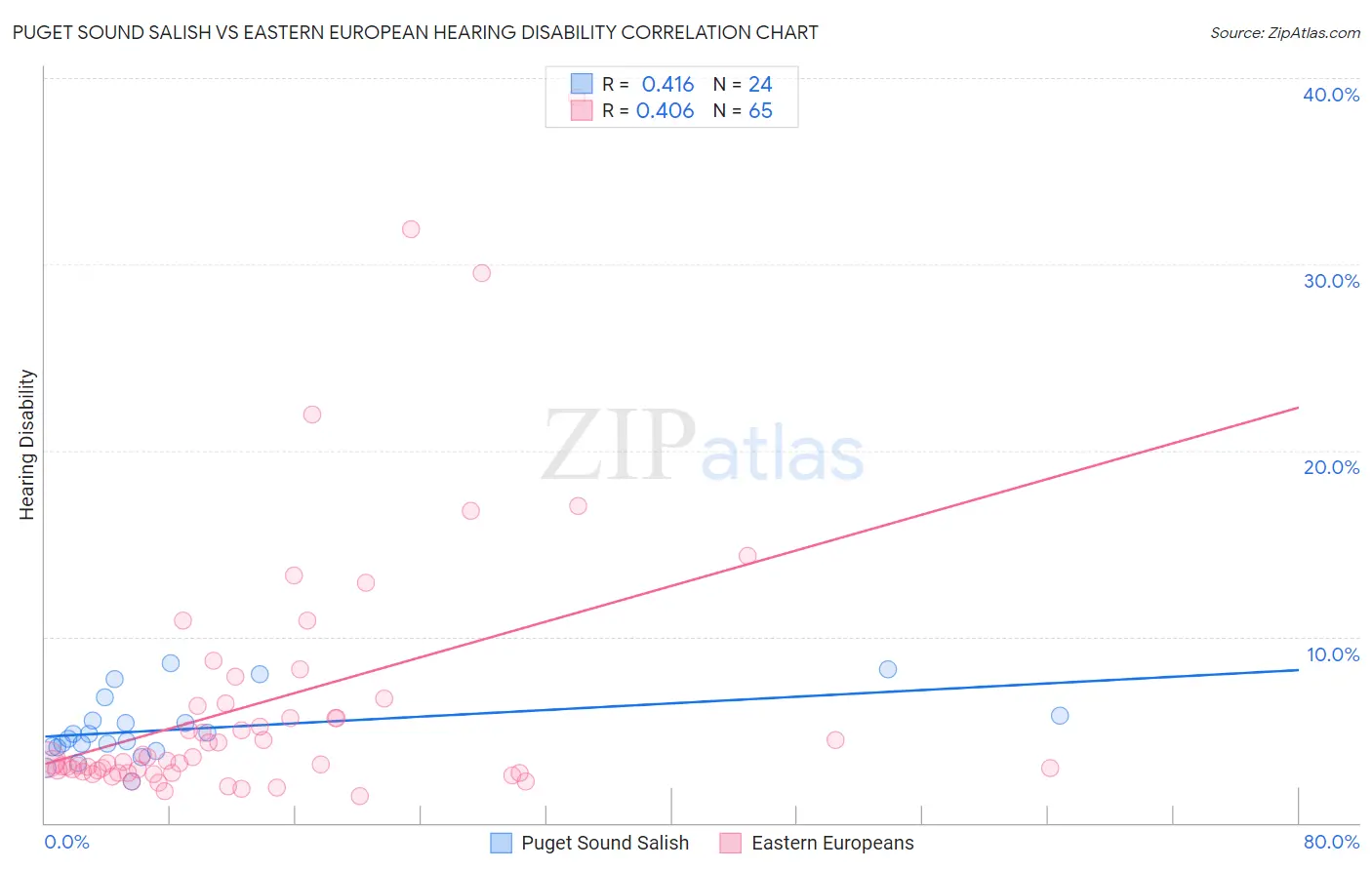Puget Sound Salish vs Eastern European Hearing Disability
COMPARE
Puget Sound Salish
Eastern European
Hearing Disability
Hearing Disability Comparison
Puget Sound Salish
Eastern Europeans
3.9%
HEARING DISABILITY
0.0/ 100
METRIC RATING
315th/ 347
METRIC RANK
3.1%
HEARING DISABILITY
15.5/ 100
METRIC RATING
206th/ 347
METRIC RANK
Puget Sound Salish vs Eastern European Hearing Disability Correlation Chart
The statistical analysis conducted on geographies consisting of 46,152,047 people shows a moderate positive correlation between the proportion of Puget Sound Salish and percentage of population with hearing disability in the United States with a correlation coefficient (R) of 0.416 and weighted average of 3.9%. Similarly, the statistical analysis conducted on geographies consisting of 461,059,172 people shows a moderate positive correlation between the proportion of Eastern Europeans and percentage of population with hearing disability in the United States with a correlation coefficient (R) of 0.406 and weighted average of 3.1%, a difference of 26.8%.

Hearing Disability Correlation Summary
| Measurement | Puget Sound Salish | Eastern European |
| Minimum | 2.2% | 1.4% |
| Maximum | 8.6% | 39.0% |
| Range | 6.3% | 37.5% |
| Mean | 5.0% | 6.5% |
| Median | 4.6% | 3.4% |
| Interquartile 25% (IQ1) | 4.1% | 2.7% |
| Interquartile 75% (IQ3) | 5.6% | 6.4% |
| Interquartile Range (IQR) | 1.5% | 3.6% |
| Standard Deviation (Sample) | 1.7% | 7.3% |
| Standard Deviation (Population) | 1.7% | 7.3% |
Similar Demographics by Hearing Disability
Demographics Similar to Puget Sound Salish by Hearing Disability
In terms of hearing disability, the demographic groups most similar to Puget Sound Salish are Yakama (3.9%, a difference of 0.010%), Hopi (3.9%, a difference of 0.18%), Spanish American (4.0%, a difference of 0.20%), Cajun (3.9%, a difference of 0.29%), and Comanche (4.0%, a difference of 0.33%).
| Demographics | Rating | Rank | Hearing Disability |
| Ottawa | 0.0 /100 | #308 | Tragic 3.8% |
| Scotch-Irish | 0.0 /100 | #309 | Tragic 3.8% |
| Cree | 0.0 /100 | #310 | Tragic 3.8% |
| Americans | 0.0 /100 | #311 | Tragic 3.9% |
| Cajuns | 0.0 /100 | #312 | Tragic 3.9% |
| Hopi | 0.0 /100 | #313 | Tragic 3.9% |
| Yakama | 0.0 /100 | #314 | Tragic 3.9% |
| Puget Sound Salish | 0.0 /100 | #315 | Tragic 3.9% |
| Spanish Americans | 0.0 /100 | #316 | Tragic 4.0% |
| Comanche | 0.0 /100 | #317 | Tragic 4.0% |
| Cheyenne | 0.0 /100 | #318 | Tragic 4.0% |
| Chippewa | 0.0 /100 | #319 | Tragic 4.0% |
| Shoshone | 0.0 /100 | #320 | Tragic 4.0% |
| Paiute | 0.0 /100 | #321 | Tragic 4.1% |
| Seminole | 0.0 /100 | #322 | Tragic 4.1% |
Demographics Similar to Eastern Europeans by Hearing Disability
In terms of hearing disability, the demographic groups most similar to Eastern Europeans are Immigrants from Czechoslovakia (3.1%, a difference of 0.070%), Alsatian (3.1%, a difference of 0.070%), Hispanic or Latino (3.1%, a difference of 0.070%), Immigrants from Denmark (3.1%, a difference of 0.12%), and Immigrants from Thailand (3.1%, a difference of 0.16%).
| Demographics | Rating | Rank | Hearing Disability |
| Syrians | 19.2 /100 | #199 | Poor 3.1% |
| Immigrants | North Macedonia | 19.1 /100 | #200 | Poor 3.1% |
| Iraqis | 19.0 /100 | #201 | Poor 3.1% |
| Immigrants | Thailand | 16.4 /100 | #202 | Poor 3.1% |
| Immigrants | Denmark | 16.2 /100 | #203 | Poor 3.1% |
| Immigrants | Czechoslovakia | 15.9 /100 | #204 | Poor 3.1% |
| Alsatians | 15.9 /100 | #205 | Poor 3.1% |
| Eastern Europeans | 15.5 /100 | #206 | Poor 3.1% |
| Hispanics or Latinos | 15.1 /100 | #207 | Poor 3.1% |
| Immigrants | Latvia | 12.7 /100 | #208 | Poor 3.1% |
| Immigrants | Hungary | 12.5 /100 | #209 | Poor 3.1% |
| Cape Verdeans | 12.2 /100 | #210 | Poor 3.1% |
| Romanians | 12.1 /100 | #211 | Poor 3.1% |
| Pakistanis | 11.1 /100 | #212 | Poor 3.1% |
| Immigrants | Iraq | 10.5 /100 | #213 | Poor 3.1% |